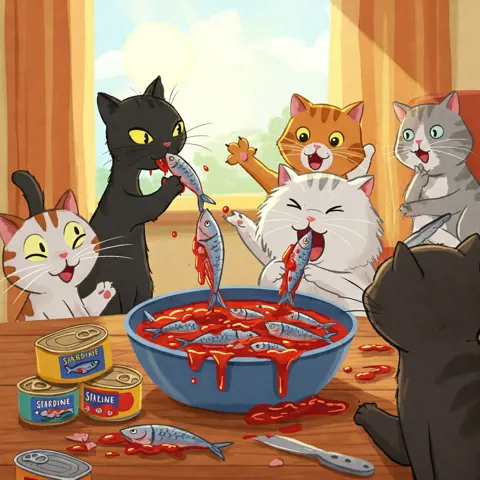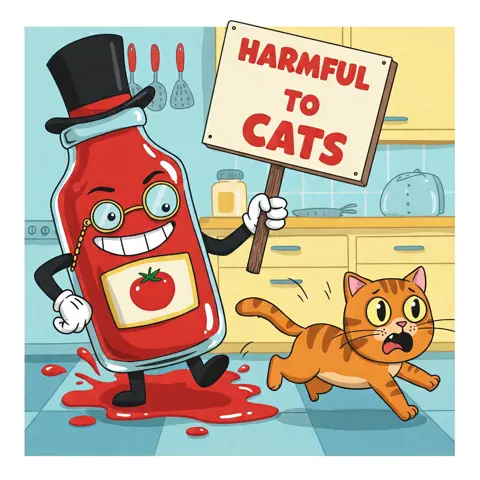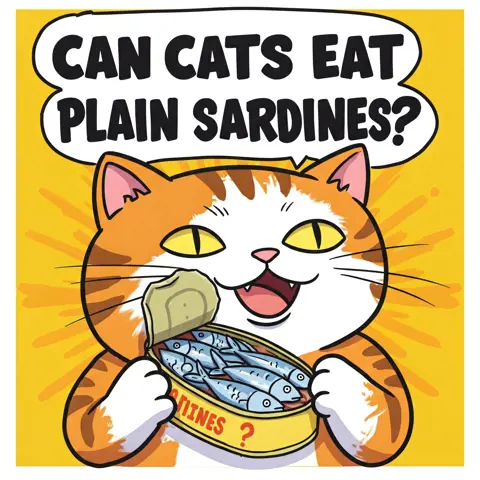Can Cats Eat Sardines in Tomato Sauce? Vet-Inspired Advice on Safety and Nutrition

How We Ensure Accuracy
At CatsLib, we take the accuracy of the information we provide very seriously. Our content is created and reviewed by experts to ensure that every piece of advice is not only helpful but also based on the latest veterinary research. Here’s how we make sure the information you read is reliable:
- ✔ Content reviewed by experts
- ✔ Based on up-to-date expert-reviewed veterinary sources
- ✔ Reviewed regularly for relevance and accuracy
In This Article
Are Sardines in Tomato Sauce Safe for Cats?Nutritional Benefits and Risks of Sardines for Cats
Feeding Guidelines: How to Safely Provide Sardines to Your Cat
Alternatives to Sardines in Tomato Sauce
Signs to Watch Out For: When Tomato Sauce Harms Cats
Conclusion
Sardines in tomato sauce might sound like a tempting treat for your cat, but is it really safe to share? While sardines themselves can offer nutritional benefits, the tomato sauce they’re packed in raises some important concerns. Ingredients like garlic, onion, or excess salt often found in tomato sauces can be harmful to cats. Understanding the risks and how they might affect your feline friend is key before making sardines in tomato sauce a part of their diet.
Are Sardines in Tomato Sauce Safe for Cats?
Sardines alone are a rich source of protein, omega-3 fatty acids, and other nutrients that can benefit your cat. However, the tomato sauce they are often packed in presents certain risks. If you're contemplating whether sardines in tomato sauce for cats is a good idea, knowing what's inside the sauce is crucial. Let's take a closer look at how certain ingredients and the sauce itself can potentially affect your feline friend.
Ingredients in Tomato Sauce Harmful to Cats
While plain tomatoes are generally non-toxic in small amounts, the problem lies in the other ingredients found in most commercially made tomato sauces. Here are some common components to watch out for:
-
Garlic and Onions: These are among the most harmful ingredients for cats. Even in small quantities, garlic and onions can cause gastrointestinal distress and damage red blood cells, leading to anemia. Whether fresh, powdered, or cooked, these are a big no-no.
-
Salt Content: Excess salt in tomato sauce can disrupt your cat’s electrolyte balance. Sodium poisoning, though rare, could be a real risk if large amounts are consumed. Symptoms include lethargy, vomiting, and excessive thirst.
-
Sugar and Artificial Additives: Some sauces include sugar or artificial sweeteners, which offer no nutritional value and could contribute to other health problems, such as weight gain or digestive upset.
-
Spices and Seasonings: Ingredients like black pepper, paprika, or chili powder might not cause immediate toxicity, but they can irritate a cat’s stomach lining, leading to vomiting or diarrhea.
These components make it clear that tomato sauce ingredients harmful to cats aren't just hypothetical—they're very real risks you shouldn't overlook when considering if sardines in tomato sauce are safe for your pet.
Can Tomato Sauce Make Cats Sick?

The short answer: yes, it absolutely can. This doesn’t mean every cat will react the same way, but prolonged or excessive exposure to tomato sauce can lead to both immediate and long-term health concerns.
Here are some potential side effects of sardines in tomato sauce for cats:
-
Digestive Problems: Vomiting, diarrhea, or an upset stomach can happen soon after consuming tomato sauce. Cats have sensitive digestive systems, and the acidity from tomatoes combined with other harsh ingredients could easily overwhelm them.
-
Anemia Symptoms: If a cat eats tomato sauce with garlic or onion, you might notice weakness, reduced appetite, or pale gums—potential signs of anemia.
-
Sodium Toxicity: High salt levels in tomato sauce can result in dehydration or more severe symptoms like muscle tremors and seizures in extreme cases.
-
Long-Term Impacts: Regular consumption of ingredients like salt and spices could lead to chronic issues such as kidney strain or obesity.
If you’re wondering is tomato sauce bad for cats or can tomato sauce make cats sick, keep in mind that the risks far outweigh any potential enjoyment your cat may derive from this food. If your cat ever eats tomato sauce unintentionally, monitor them closely for symptoms like vomiting, diarrhea, or lethargy, and consult your vet if you notice anything concerning.
A Word of Advice
Instead of feeding sardines in tomato sauce, consider plain sardines as a safer alternative. Not only do they eliminate the risks associated with tomato sauce, but they also retain all the nutritional benefits that your cat can enjoy.
Nutritional Benefits and Risks of Sardines for Cats
Sardines are a nutrient-packed fish that can provide significant health benefits for your cat, but it's important to weigh these perks against potential risks—especially when they're served in tomato sauce. Let’s explore the details so you can make an informed choice for your furry companion.
Are Sardines Healthy for Cats?
Absolutely, sardines can be a healthy treat for your feline friend when given in moderation. They are loaded with essential nutrients that support overall cat health, including:
-
Protein: Sardines are rich in high-quality protein, which is vital for muscle maintenance and overall energy. Cats—being obligate carnivores—thrive on protein sources like fish.
-
Omega-3 Fatty Acids: These healthy fats contribute to a shiny coat, reduced inflammation, and healthier skin.
-
Vitamin D: Found naturally in sardines, vitamin D supports bone health and overall cellular function in cats.
-
Taurine: This amino acid, which is critical for heart, eye, and reproductive health, can be found in many fish varieties, including sardines.
-
B12 and Other Vitamins: Sardines are rich in vitamin B12 and other micronutrients that boost your cat’s immunity and energy levels.
While sardines can be highly beneficial, they should always be served plain—free from added oils, salts, or sauces. Too much of a good thing can pose risks, so offering sardines sparingly is the key to incorporating their benefits into your cat’s diet.
Side Effects of Sardines in Tomato Sauce for Cats

Feeding your cat sardines in tomato sauce introduces a range of concerns that could outweigh the nutritional advantages. Here are some notable side effects and why they occur:
-
Digestive Upset:
Cats have sensitive stomachs, and the acidic nature of tomato sauce coupled with potential seasonings can lead to vomiting or diarrhea. Additionally, ingredients like garlic or onion—often added to enhance flavor in tomato sauces—are outright toxic to cats.
-
Sodium Overload:
Many canned sardines in tomato sauce contain high levels of salt. Excessive sodium intake can lead to dehydration and, in severe cases, sodium poisoning with symptoms such as lethargy, vomiting, and loss of coordination.
-
Food Sensitivities or Allergies:
Cats might react adversely to artificial ingredients, flavorings, or preservatives found in tomato sauce. Symptoms like skin irritation or gastrointestinal discomfort can indicate a reaction.
-
Long-Term Health Risks:
If consumed regularly, sardines in tomato sauce can contribute to kidney problems or obesity over time due to high salt content and overwhelming calorie density. Cats are less capable of processing these added elements compared to humans.
To play it safe, skip the tomato sauce altogether and opt for plain, unsalted sardines, ensuring your cat gets the good stuff without any unnecessary risks.
Feeding Guidelines: How to Safely Provide Sardines to Your Cat
Cats and sardines can be a healthy match made in nutritional heaven—but only if served correctly. While sardines are packed with nutrients your feline can benefit from, feeding them the wrong kind or in inappropriate portions can create more harm than good. Let’s break down the essential tips for offering sardines to your cat safely.
Best Types of Sardines for Cats
Not all sardines are created equal, and the variety you choose can significantly affect your cat's health. Here are the most common types of sardines you'll come across in stores and their suitability for cats:
-
Plain Sardines: These are the best choice for your cat. Free from added oils, salts, or seasonings, plain sardines provide all the nutritional benefits without unwanted extras. Look for sardines labeled as unsalted or no-sodium.
-
Sardines in Water: Sardines packed in water are a safe and hydrating option. They are free from unhealthy added fats and still deliver the nutrients cats love. Ensure there’s no added salt to keep it problem-free.
-
Sardines in Oil: While these may seem harmless, the oils (often soybean or sunflower oil) can be hard on your cat’s stomach and contribute to unnecessary calorie consumption. If these are your only option, rinse them thoroughly before serving.
-
Steer clear of sardines packed in sauces—like tomato or mustard—as they often contain harmful ingredients (think salt, spices, and garlic) that pose serious risks to cats. Simplicity is key when feeding sardines safely.
How Often Can Cats Eat Sardines?
Sardines are a nutrient-rich treat for your cat, but moderation is essential. Overfeeding can lead to health issues like obesity or excessive mercury accumulation from fish consumption. So, how much is too much?
-
Portion Size: One small sardine is usually enough for a single serving. Break it into smaller pieces if needed to avoid overloading your cat’s sensitive stomach.
-
Frequency: You can offer sardines once a week as a special treat. This strikes a good balance between providing the nutritional benefits without overdoing it.
Stick to this schedule, and remember: sardines are not meant to replace your cat's primary diet. They should complement a balanced cat food regimen rather than becoming a staple. Always consult your vet if you're unsure about how to incorporate sardines into your cat's diet.
Alternatives to Sardines in Tomato Sauce
While sardines may be a great nutritional boost for your cat, the presence of tomato sauce complicates matters. If you're set on introducing fish to your feline's diet but want to prioritize their health and safety, there are safer alternatives. Here's what you need to know about different options and their benefits.
Can Cats Eat Plain Sardines or Sardines in Water?

Plain sardines or those packed in water are far safer options for your cat compared to sardines in tomato sauce. Why? It's all about avoiding the problematic ingredients that could cause harm.
-
Minimally Processed: Sardines that come without added salt, oils, or seasoning are ideal. Cats thrive on simple, unprocessed foods that mimic their natural diet.
-
Hydration-Friendly: Sardines in water not only skip the harmful additions of tomato sauces but also include a bit of extra hydration for your cat. Just be sure there's no added salt or flavoring.
-
Tomato Sauce Risks: Even when tomato sauce looks innocent, it often hides ingredients like garlic, onion, and spices, which are toxic to cats. Keeping it plain eliminates these risks and ensures your cat enjoys sardines safely.
By sticking to sardines in their plain or water-packed form, you're giving your cat all the core health benefits—like omega-3s and protein—without the accompanying dangers.
Other Fish Safe for Cats
There are several other fish options you can consider if sardines in tomato sauce are not suitable. Each brings unique benefits and can be a nutritious treat for your feline:
-
Salmon: Rich in omega-3 fatty acids. Promotes a shiny coat and reduces inflammation. Serve it cooked and unseasoned to avoid any harmful oils or spices.
-
Tuna: Packed with protein and a feline favorite in terms of flavor. Moderation is key due to a higher mercury content. Opt for water-packed, unsalted tuna.
-
Mackerel: Provides essential vitamins like B12 and minerals. A good source of omega-3s to support heart and joint health. Always serve fresh or water-packed, avoiding canned versions with added sauces.
-
Whitefish: Includes cod or haddock, which are light, lean protein sources for cats. A great hypoallergenic option (if your cat has sensitivities).
These fish options are generally safe for cats when served correctly—cooked plain, free of spices, or unnecessary additives. They can become excellent occasional treats or even be incorporated into your cat's diet in consultation with your vet.
If fish is a regular part of your cat’s meals, ensure variety and moderation. Overfeeding fish, particularly types high in mercury, might lead to long-term health implications. Keeping it simple and prioritizing your cat’s wellbeing will always pay off.
Signs to Watch Out For: When Tomato Sauce Harms Cats
If your cat gets into tomato sauce—whether by accident or curiosity—it's important to know what signs to look for and how to respond quickly. While a small lick might not always be harmful, the ingredients commonly found in tomato sauce can cause serious problems for cats. Recognizing symptoms of toxicity and knowing the right steps to take could save your furry friend from complications.
Symptoms of Tomato Sauce Toxicity in Cats

Cats may exhibit immediate or delayed symptoms after consuming tomato sauce, depending on the quantity eaten and the ingredients involved. If your cat has ingested tomato sauce, watch for the following signs:
-
Vomiting or Diarrhea: These are often the first indicators of food toxicity in cats. The acidity of tomatoes or the presence of ingredients like garlic and onions can irritate your cat's stomach.
-
Lethargy: A noticeable drop in energy levels could mean they’re not feeling well. It may be a reaction to salt content or other harmful ingredients disrupting their system.
-
Drooling or Pawing at the Mouth: This could indicate an adverse reaction to the taste or spices in the sauce.
-
Increased Thirst or Urination: High salt levels in some tomato sauces can upset your cat’s hydration balance, causing unusual drinking behaviors.
-
Pale Gums or Weakness: These symptoms may point to anemia, especially if garlic or onion is part of the sauce.
-
Seizures or Tremors: In extreme cases of toxicity, neurological symptoms like tremors or seizures might occur. This is rare but requires immediate veterinary attention.
If you notice any combination of these symptoms, take them seriously. Even if your cat seems fine at first, delayed reactions are possible, especially with ingredients like garlic and onion, which can take a toll over time.
What to Do If Cats Consume Tomato Sauce
Acting swiftly is crucial if your cat has consumed a harmful amount of tomato sauce. Here’s what you need to do to ensure their safety:
-
Remove Access Immediately: If there’s leftover tomato sauce your cat can still reach, remove it right away to prevent further ingestion.
-
Check the Ingredients: Look at the label if the sauce is store-bought or recall the recipe if it’s homemade. Ingredients like garlic, onion, salt, and spices should raise immediate concern.
-
Monitor for Symptoms: Start watching for any unusual behavior or physical signs such as vomiting, lethargy, or changes in appetite. Make note of these symptoms to share with your vet if necessary.
-
Call Your Vet: Contact your veterinarian to explain the situation, even if your cat isn’t showing severe symptoms yet. They may recommend bringing in your pet or providing care advice over the phone. Prompt action could prevent symptoms from escalating.
-
Avoid Home Remedies: It’s best to stick to your vet’s guidance instead of trying to induce vomiting or flushing their system on your own. Improper handling might make it worse.
By knowing the warning signs and acting decisively, you can protect your cat from further harm if they accidentally consume tomato sauce. Always prioritize plain and unseasoned food options for your furry friend to prevent situations like this from happening again.
Conclusion
When it comes to feeding your cat sardines in tomato sauce, caution is a must.
While sardines offer excellent nutritional benefits for cats, the tomato sauce introduces risks like harmful ingredients and potential digestive upset. For your feline's health and happiness, plain sardines or those packed in water are far better alternatives.
Always prioritize simple, unseasoned options to avoid any hidden dangers. Remember, your cat’s dietary safety should always come first. If you’ve got any concerns about what’s safe, consult your veterinarian for personalized advice.
Frequently Asked Questions
- Can cats eat sardines in tomato sauce?
- While plain sardines are safe for cats in moderation, sardines in tomato sauce are not ideal. The sauce may contain ingredients like onion, garlic, salt, or added spices, which are harmful to cats.
- Is tomato sauce toxic to cats?
- Tomato sauce is not toxic by itself, but many store-bought varieties contain additives like garlic, onion, or excess salt. These can be dangerous for cats, even in small amounts.
- What happens if my cat eats sardines in tomato sauce?
- A small amount might not cause harm if the sauce doesn’t include toxic ingredients. However, eating too much could lead to stomach upset, vomiting, or diarrhea. If you notice any unusual symptoms, consult your vet.
- Can I rinse off the tomato sauce and still feed the sardines to my cat?
- Rinsing the sardines may remove surface sauce, but it won’t eliminate all traces or reduce high salt content. It’s better to offer your cat plain sardines that are packed in water with no additives.
- Are there any safe alternatives to sardines in tomato sauce for cats?
- Yes, plain sardines in water are a better option. Avoid versions packed in oil, brine, or with added seasonings. Always check the label for any harmful additives.
- Can tomato sauce cause long-term health issues for cats?
- If a cat eats tomato sauce occasionally and it contains unsafe ingredients like garlic or onion, it could lead to anemia over time. High sodium levels may also strain the kidneys.
- Why do cats like sardines so much?
- Sardines are rich in omega-3 fatty acids and have a strong smell that attracts cats. They’re a tasty treat but should only be given occasionally in a form that’s safe for cats.
- How much sardine is safe for my cat to eat?
- A small portion, like a teaspoon or two, is fine for most cats as an occasional treat. Too much can upset their stomach or contribute to weight gain.
- What should I do if my cat ate sardines in tomato sauce?
- Monitor your cat for symptoms like vomiting, diarrhea, or lethargy. If they seem unwell or you know the sauce contained harmful ingredients like garlic, contact your veterinarian immediately.
- Can kittens eat sardines in tomato sauce?
- Kittens are more sensitive to toxic ingredients than adult cats. Sardines in tomato sauce should be avoided entirely. If you want to treat your kitten, stick to plain, unseasoned sardines.
- Should I let my cat taste other foods with tomato sauce?
- It’s best to avoid feeding any food with tomato sauce to your cat. Even small amounts may contain harmful ingredients or upset their stomach.
- Does the type of canned sardine matter?
- Yes, always read the label. Choose plain sardines in water with no added salt, oils, or flavorings. Avoid sardines packed in tomato sauce, oil, or brine.
- Are there health benefits to feeding plain sardines to cats?
- Plain sardines can provide a good source of protein, omega-3 fatty acids, and essential nutrients. They promote a healthy coat, skin, and overall well-being when given as an occasional treat.
- How often can I give sardines to my cat?
- Limit sardines to once or twice a week as a small treat. Too much fish in a cat’s diet can lead to mercury buildup or imbalance essential nutrients. Always keep their main diet balanced.
CatsLib.com relies on trusted, high-quality sources, including peer-reviewed research, to back the information in its articles. We regularly review and update our content to ensure it remains accurate and reliable.
This guide is based on expert-reviewed veterinary sources, including PetMD, VCA Hospitals, and the ASPCA. While we are not veterinarians, all information is grounded in trusted resources to help you make informed decisions about your cat’s health.
- ASPCA: People Foods to Avoid Feeding Your Pets
- PetMD: Can Cats Eat Fish?
- Cornell Feline Health Center
If you have concerns about your pet's health or any medical questions, we highly recommend consulting a qualified veterinarian. The information on this site is for general informational purposes only and should not be used as a substitute for professional advice, diagnosis, or treatment.
Recent Articles

Cats Sticking Their Tongue Out – Should You Be Worried?

Why Does Your Cat Scratch Around Its Food Bowl? Top Reasons and Simple Solutions

10 Medical Reasons Your Cat Is Walking in Circles – Signs You Should Never Ignore

Do Ragdoll Cats Shed a Lot? Seasonal Tips to Manage Fur and Keep Your Home Clean

Why Are Siamese Cats Cross Eyed? Genetics, Health, and Care Guide

